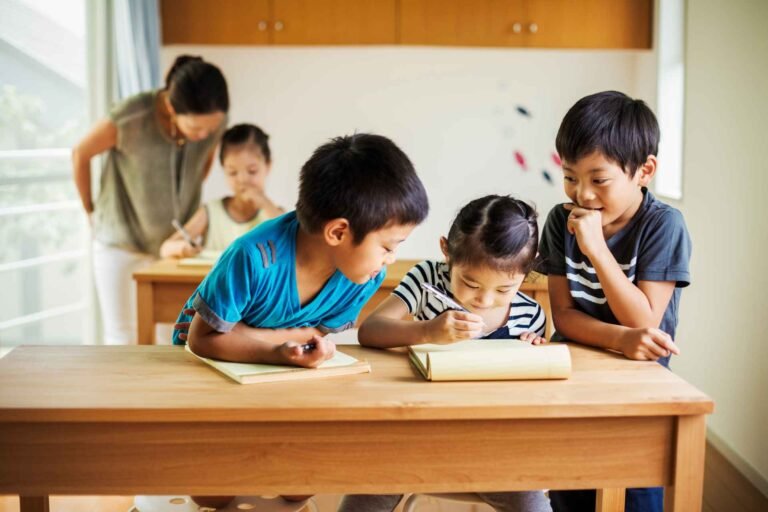What is Progressive Education and Its Benefits to Your Child?
Progressive education promotes individual interests and critical thinking through active learning, fostering independence, problem-solving, and social/emotional growth, resulting in engaged and successful child.
Table of Contents
What is Progressive Education?
Progressive education is an educational philosophy and approach that emphasizes learner-centered, experiential, and activity-based learning. It focuses on the individual needs, interests, and abilities of students, and encourages critical thinking and problem solving skills.
Progressive education seeks to move away from traditional teacher-centered instruction, where students are passive recipients of knowledge, towards a more collaborative and engaging learning environment, where students actively participate in the learning process.
This approach typically includes:
- interdisciplinary studies
- hands-on learning
- project-based assessments
- and fostering a lifelong love for learning.
The goal of progressive education is to prepare students for an ever-changing world by equipping them with the skills, knowledge, and dispositions needed to be independent, creative, and responsible individuals who can contribute positively to society.




What are the benefits of Progressive Education to your child?
Progressive education is based on the belief that education should not only transmit knowledge but also prepare students as critical thinkers and active participants in a democratic society.
1. Student-Centered Learning
Progressive Education focuses on the interests, needs, and experience of students, rather than adhering strictly to a predetermined curriculum. This approach encourages students to explore their passions and learn through experiences that are meaningful to them.
2. Active and Experiential Learning
It emphasizes learning through doing. Students engage in hands-on activities, projects, and real-world problem-solving, rather than solely through traditional lectures and rote memorization.
3. Holistic Education
It aims to develop the whole child, addressing emotional, social, and physical development, in addition to cognitive skills. The goal is to nurture well-rounded individuals.
4. Critical Thinking and Problem-Solving
Progressive education encourages students to think critically, ask questions, and engage in problem-solving, fostering independent thought and creativity.
5. Collaborative and Cooperative Learning
Students often work in groups, which helps them develop social skills and learn to collaborate and communicate effectively with others.
6. Democracy and Social Responsibility
The classroom environment often mirrors a democratic society, where students have a voice in their learning and are taught the value of community and social responsibility.
7. Integration of Curriculum
Subjects are often taught in an integrated manner, reflecting the interconnectedness of knowledge in the real world, rather than in isolated academic silos.
Success Stories
Here’s what parents of our students say about The Sycamore – a progressive education center in Calamba.

As important as it is to be able to progress academically, our son's experience with The Sycamore has not just motivated him to be a better student but encouraged him to improve himself in ways that made him a better individual - as a son, a grandson, a brother, a cousin, a student, and a friend.
He is always looking forward to be in school. He has very patient teachers and his classmates are really compassionate and kind.”
Angela Cataquiz
Basti gained more confidence in expressing his thoughts and feelings.
He is well-loved by his teachers and classmates.
Michelle Lobendino


I watched my children bloom into confident, intelligent children. They really flourished with the love and care of their teachers, as well as their schoolmates!
I love how The Sycamore is so much like a family. It is so easy to communicate with the teachers and administration. There are great teacher-student-parent dynamics. I love how the teachers are always available to talk about anything, and they really care about the growth and well-being of their students.
Rio Nieto Tuason
Frequently asked questions about Progressive Education
1. How does progressive education differ from traditional education?
Progressive education differs in its focus on the student’s overall development and active participation, rather than passive absorption of a standardized curriculum.
2. Is progressive education effective for all students?
This depends on the individual learning styles and needs. While many thrive in a progressive environment, others may benefit more from traditional structures.
3. How are teachers trained for progressive education?
Teachers typically undergo specific training in student-centered techniques, collaborative learning, and curriculum integration.
4. Can progressive education be implemented in public schools, or is it limited to private institutions like The Sycamore?
While more commonly found in private schools like The Sycamore Center for Education, many of its principles can be and are implemented in public schools.
5. How is success measured in a progressive education system?
Success is often measured through student portfolios, projects, and practical applications of learning, rather than standardized tests.
6. Does progressive education prepare students for college and the workforce?
It aims to prepare students not only academically but also with critical thinking, problem-solving skills, and adaptability, which are valuable for higher education and the workforce.
7. How does progressive education address students with special
Subjects are often taught in an integrated manner, reflecting the interconnectedness of knowledge in the real world, rather than in isolated academic silos.
8. Role of the Teacher
In progressive education, teachers act more as facilitators or guides rather than authoritative sources of knowledge. They support and guide students in their learning journey, encouraging exploration and discovery.

